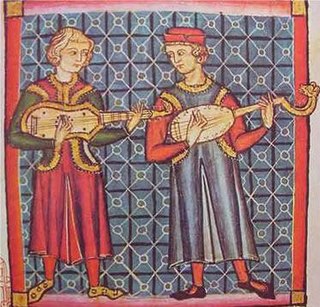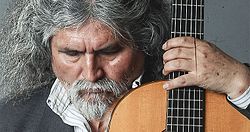
In the Quechua, Aymara, and Inca mythologies, Supay was both the god of death and ruler of the Ukhu Pacha, the Incan underworld, as well as a race of demons. Supay is associated with miners' rituals.

Andean music is a group of styles of music from the Andes region in South America.
Peruvian music is an amalgamation of sounds and styles drawing on Peru's Andean, Spanish, and African roots. Andean influences can perhaps be best heard in wind instruments and the shape of the melodies, while the African influences can be heard in the rhythm and percussion instruments, and European influences can be heard in the harmonies and stringed instruments. Pre-Columbian Andean music was played on drums and string instruments, like the European pipe and tabor tradition. Andean tritonic and pentatonic scales were elaborated during the colonial period into hexatonic, and in some cases, diatonic scales.

The Portuguese guitar or Portuguese guitarra is a plucked string instrument with twelve steel strings, strung in six courses of two strings. It is one of the few musical instruments that still uses watch-key or Preston tuners. It is iconically associated with the musical genre known as Fado.

Pepe Romero is a classical and flamenco guitarist.

Tondero is a dance and guitar rhythm from Peru that developed in the country's northern coastal region (Piura–Lambayeque).

Benjamín "Chamín" Correa was a Mexican guitarist. He was renowned in the Spanish-speaking world for his traditional romantic music. Member of Los Tres Caballeros together with Roberto Cantoral and Leonel Gálvez from 1954. In 1957 they gained 4 golden discs for being the trio of major success on a global scale. He died in Cuernavaca, Morelos at the age of 90.

Delfeayo Marsalis is an American jazz trombonist, record producer and educator.
Jaime Guillermo Guardia Neyra was a Peruvian singer and charango player. Considered a master of the Ayacucho regional style of traditional Andean music, he performed and recorded as a solo act and with the group Lira Paucina. He was born in Pauza, Parinacochas Province, department of Ayacucho.

The Dos de Mayo Province is one of eleven provinces of the Huánuco Region in Peru. The capital of this province is the city of La Unión.

The Huacaybamba Province is one of eleven provinces of the Huánuco Region in Peru. The capital of this province is the city of Huacaybamba.
"El Cóndor Pasa" is an orchestral musical piece from the zarzuela El Cóndor Pasa by the Peruvian composer Daniel Alomía Robles, written in 1913 and based on traditional Andean music, specifically folk music from Peru.

The cythara is a wide group of stringed instruments of medieval and Renaissance Europe, including not only the lyre and harp but also necked, string instruments. In fact, unless a medieval document gives an indication that it meant a necked instrument, then it likely was referring to a lyre. It was also spelled cithara or kithara and was Latin for the Greek lyre. However, lacking names for some stringed instruments from the medieval period, these have been referred to as fiddles and citharas/cytharas, both by medieval people and by modern researchers. The instruments are important as being ancestors to or influential in the development of a wide variety of European instruments, including fiddles, vielles, violas, citoles and guitars. Although not proven to be completely separate from the line of lute-family instruments that dominated Europe, arguments have been made that they represent a European-based tradition of instrument building, which was for a time separate from the lute-family instruments.
Flor Pálida is a song written and performed by Cuban singer-songwriter Polo Montañez. It was recorded for his second and final studio album Guitarra Mía (2002). It is the tenth track on the album. On the review of the album, Newsreview.com editor Christine G.K. LaPado-Breglia praised the song as "so beautiful, with its plaintive violin and heart-stirring vocals".

The Guitarra morisca or Mandora medieval is a plucked string instrument. It is a lute that has a bulging belly and a sickle-shaped headstock. Part of that characterization comes from a c. 1330 poem, Libro de buen amor by Juan Ruiz, arcipestre de Hita, which described the "Moorish gittern" as "corpulent". The use of the adjective morisca tacked to guitarra may have been to differentiate it from the commonly seen Latin European variety, when the morisca was seen on a limited basis during the 14th century.
Andrés Prado is a Peruvian guitarist and music teacher based in Lima, Peru. He has released several works with a focus on jazz, latin-jazz and Afro-Peruvian music. He teaches at the Catholic University of Peru and performs with several ensembles.
Alborada is a Peruvian group of Andean music and contemporary music created in 1984.

Antología is a contemporary urban-Andean music group from Peru, founded in 1999 by Dilio Galindo Moreno and José Meza Muñoz.












